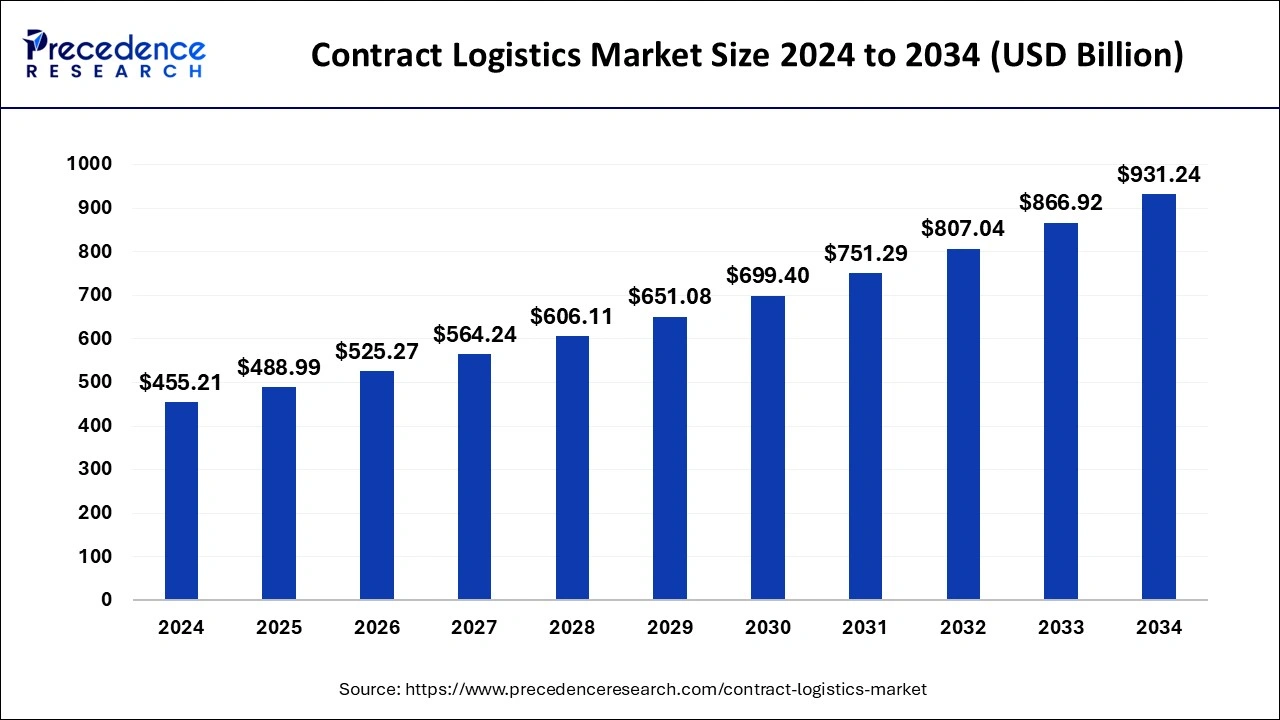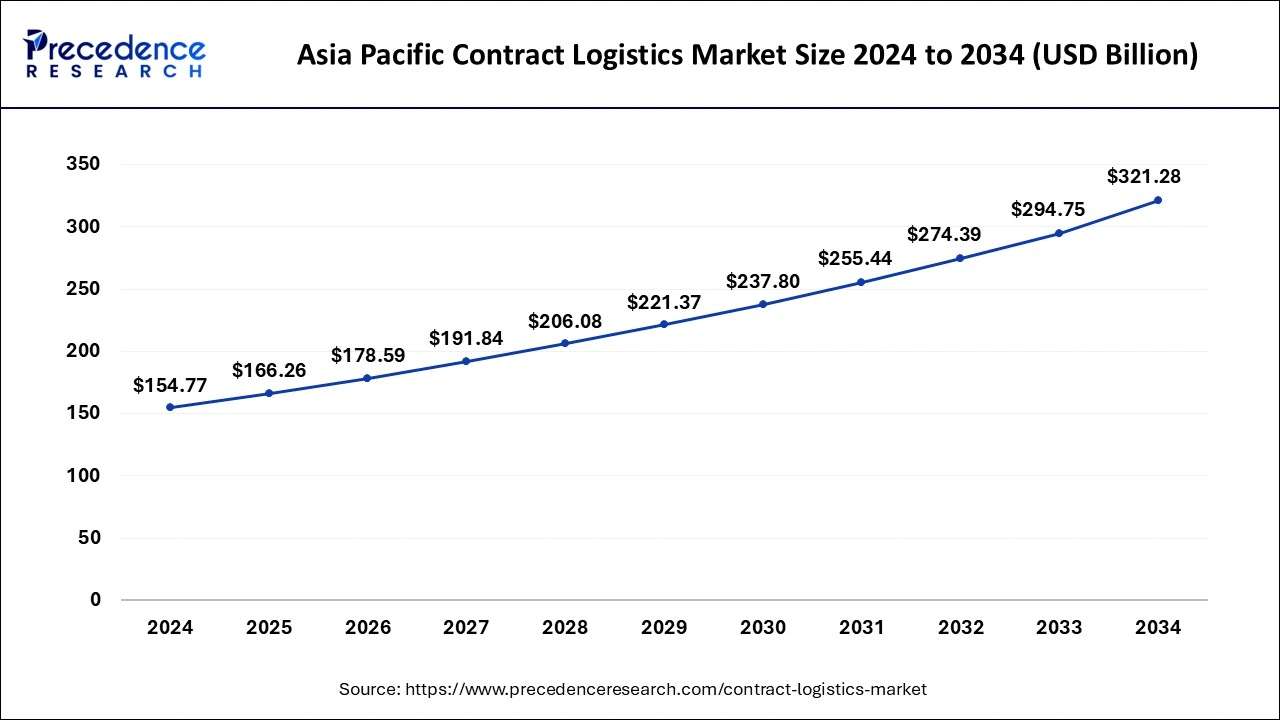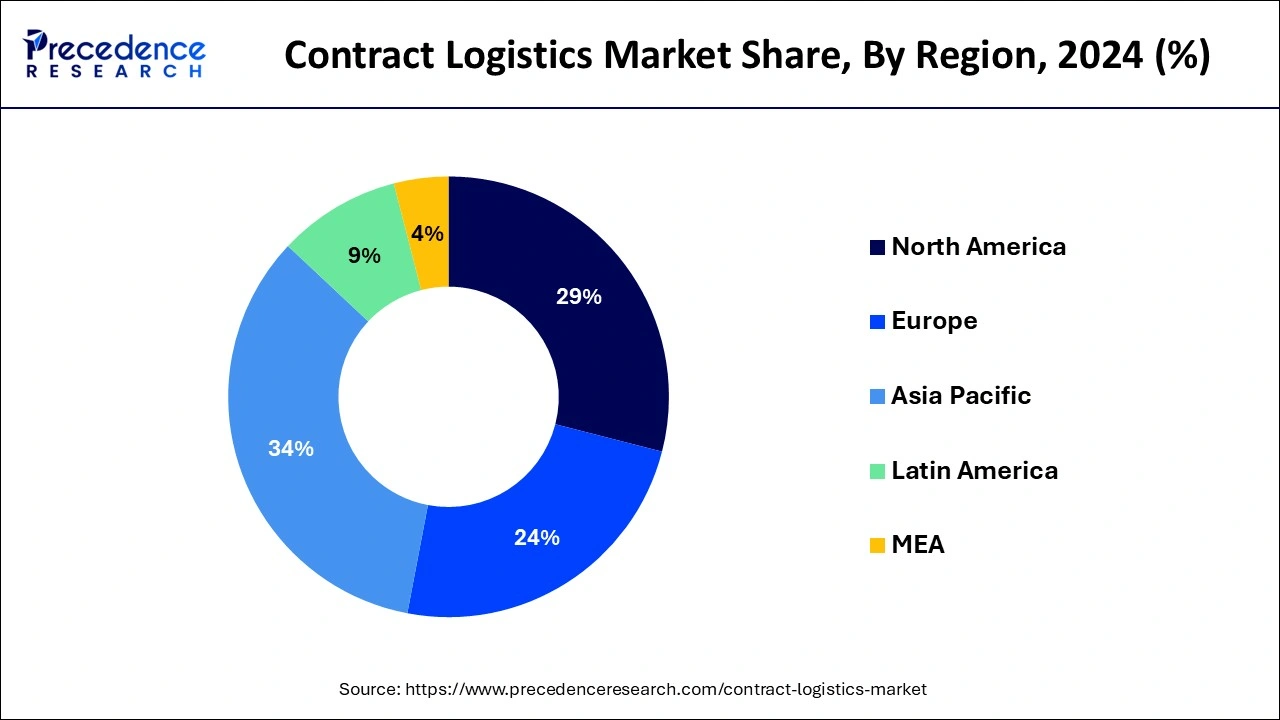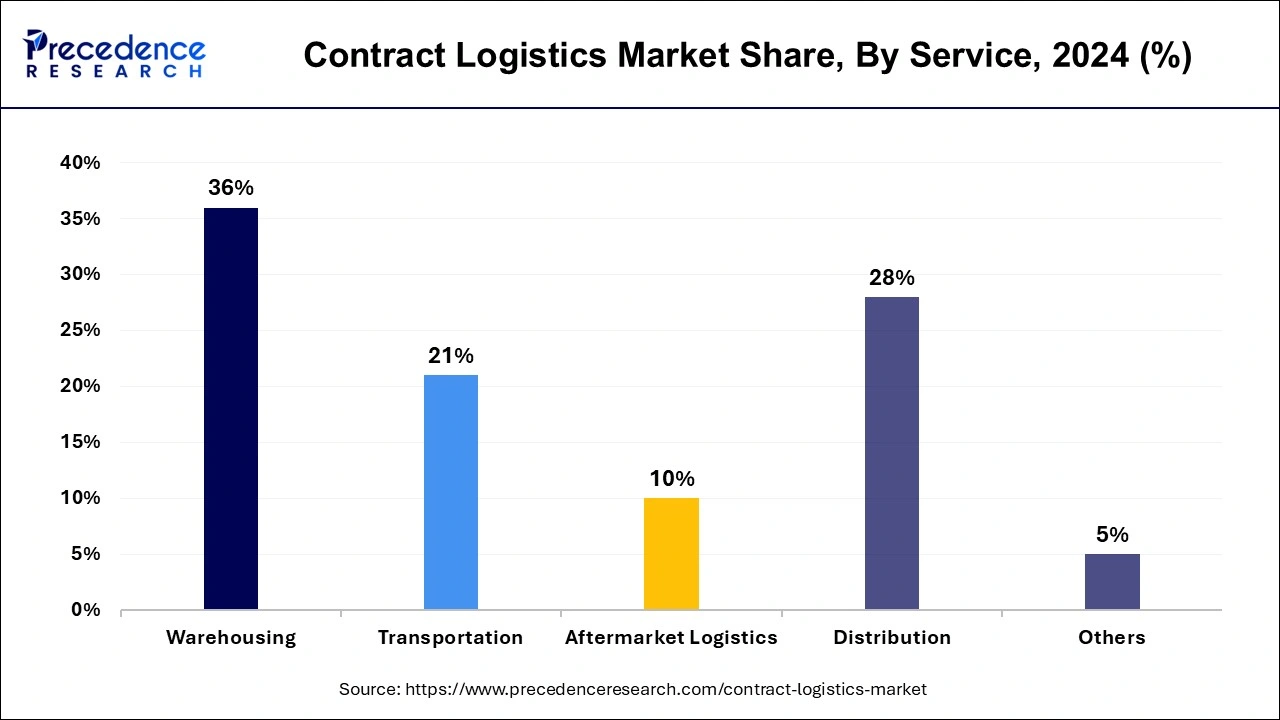Contract Logistics Market Size and Forecast 2025 to 2034
The global contract logistics market size was estimated for USD 455.21 billion in 2024 and is anticipated to reach around USD 931.24 billion by 2034, growing at a CAGR of 7.42% from 2025 to 2034. The contract logistics market is growing significantly due to the growing benefits of hiring third parties for logistics, which includes overall better management, time management, smooth flow of work, and so on.

Contract Logistics Market Key Takeaways
- Asia Pacific dominated the global contract logistics market with the largest market share of 34% in 2024.
- North America is expected to expand at a solid CAGR during the forecast period.
- By service, the warehousing segment contributed the highest market share of 36% in 2024.
How is AI Impacting the Contract Logistics Market?
Logistics companies have utilized artificial technology, or AI, to find patterns in data and provide insights. For instance, operations, including route optimization, intelligent transportation, demand forecasting, and budget planning, will benefit from its advancement. Furthermore, AI-driven logistics optimization may reduce costs through behavioral coaching and real-time forecasting to drive the contract logistics business. The projected incremental value of AI in the logistics & transportation business will be higher than that of others.
Over the past two decades, innovative logistic robotic companies have worked hard to incorporate AI & machine learning, better sensors & reaction times, logistics management software, and warehouse management software. The supply chain has lately seen an increase in warehouse automation, and vast amounts of money and investment have been made in the sector. While Google invested $500 million in JD's automated logistics, Alibaba invested $15 billion in robotic logistics infrastructure.
Asia Pacific Contract Logistics Market Size and Growth 2025 to 2034
The Asia Pacific contract logistics market size was estimated at USD 154.77 billion in 2024 and is anticipated to be surpass around USD 321.28 billion by 2034, rising at a CAGR of 7.57% from 2025 to 2034.

Asia Pacific dominated the global contract logistics market with the largest market share of 34% in 2024. At the same time, Middle East & Africa are likely to develop at the most significant CAGR over the forecast period. Early adoption of technology in e-commerce will advance the sectors.
Several bilateral and multilateral trade agreements have been made with the United Arab Emirates. In the GCC, the United Arab Emirates has close business connections with Kuwait, Bahrain, Saudi Arabia, and Oman. The United Arab Emirates enjoys free trade connectivity to Egypt, Bahrain, Jordan, Iraq, Lebanon, Kuwait, Libya, Oman, Morocco, Qatar, Palestine, Syria, Saudi Arabia, Tunisia, and Yemen via the Greater Arab Free Trade Area Agreement (GAFTA). Along with other nations, the Emirates has struck agreements with Algeria, Pakistan, South Korea, India, and the Netherlands. This will drive the contract logistics market in Middle East & Africa over the projected period.

The contract logistics industry in Asia Pacific is growing quickly as a result of the region's thriving industrial base and economic development. The need for advanced logistics solutions to handle ever-more complicated supply chains has increased as nations like China and India continue to industrialize and urbanize. The demand for effective distribution networks and cutting-edge logistics skills to support the industrial, retail, and e-commerce sectors is what is driving this expansion. Online shopping has grown in popularity due to a sizable and expanding middle class, necessitating effective order fulfillment and last-mile delivery services. Another key element driving the market's growth is the growth of e-commerce in Asia Pacific. The region's contract logistics companies are taking advantage of this trend by providing customized solutions that cater to the unique requirements of e-commerce companies, such as quick delivery and inventory control.
Market Overview
Growing government measures for economic diversification lead to infrastructure development, digitization, and industrialization. They are likely to increase the market for contract logistics and e-commerce, producing huge demand for contract logistics services. The rise in foreign direct investments (FDIs), rapid growth in the e-commerce sector, and focus on risk management in supply chains are calling in existing players with various non-asset entrants.
Additionally, the manufacturing sector's rapid expansion and focus on core competencies, the growing demand for job optimization, achieving cost efficiency, and technology supply chain integrations help to drive market growth. Some limitations and difficulties will prevent the development of the contract logistics sector. For instance, logistic database management is challenging because of elements, including potential misunderstandings that result in incorrect interpretations of facts, data, and information. The lack of experienced individuals who can comprehend and fix issues to retain transparency causes regional differences and the supply chain's complexity to affect the overall process negatively. Budget restrictions are another possible hindrance to the market.
Contract Logistics Market Growth Factors
- Technological advancements: Technology keeps transforming logistics and supply chain systems, disrupting them. Increasing adoption of IoT and innovative technologies across all industries will accelerate the development of the contract logistics market. The use of logistic software enhances operations and removes hassles with workflow. Businesses that invested in logistics management software experienced notable advancements in processes, delivery, and procedure, which fueled the expansion of the contract logistics market.
- Cloud integration: Cloud-integrated logistics management software makes it feasible to track & update pricing and inventory and monitor in real-time. Software for logistics that runs on the cloud provides real-time accuracy and total system & process control. The lifecycle of a product can be followed from ordering through distribution. It enables significant cost savings for lost goods and delayed delivery, as well as the capacity to track a single shipment at any point in its journey and reroute a misplaced consignment. All participants in a trade network can link and share data in real time, make quick choices, and scale to meet the demands of the contract logistics market owing to cloud-based logistics software.
- Integration of blockchain technology: Blockchain, commonly referred to as distributed ledger technology, enables secure and enduring recording of interpersonal transactions. The contract logistics business is driven by eliminating third parties and intermediaries who check records and coordinate transactions in a supply chain thanks to blockchain-enabled shared and secure databases. Blockchain enhances the reliability and trustworthiness of shared data, digitizes physical assets such as contracts & essential papers, streamlines office procedures, lowers costs, and allows for efficient supply chain data audits in the contract logistics sector.
Market Scope
| Report Coverage | Details |
| Market Size in 2025 | USD 488.99 Billion |
| Market Size by 2034 | USD 931.24 Billion |
| Growth Rate from 2025 to 2034 | CAGR of 7.42% |
| Largest Market | Asia Pacific |
| Base Year | 2024 |
| Forecast Period | 2025 to 2034 |
| Segments Covered | By Type, By Service, By Industrial Vertical |
| Regions Covered | North America, Europe, Asia-Pacific, Latin America, Middle East & Africa |
Market Dynamics
Driver
Growing e-commerce industry
The term "e-commerce" describes the purchasing and selling of commodities using the Internet. Product shipment to customers is included in third-party logistics service providers. The e-commerce industry also uses contract logistics services to oversee and manage the supply chain of e-commerce companies, allowing them to focus on marketing and other business-related duties. Therefore, because logistics offers the e-commerce sector so many advantages, the use of logistics services has grown significantly, which fuels the expansion of the contract logistics market.
Restraint
Shortage of skilled workforce
One of the problems facing the contract logistics industry is the shortage of trained workers. Talent with the ability to handle cutting-edge technology like robots, artificial intelligence, etc., is in short supply due to the industrial and retail sectors' increasing demand for complicated logistic demands. Hiring and retaining personnel is a challenge for logistics organizations, which raises operating expenses.
Opportunity
Various growth & expansion opportunities
There are a lot of prospects for growth and expansion in the contract logistics business. Third-party logistics companies can use their experience and make investments in cutting-edge capabilities to increase their business as a result of ongoing globalization and outsourcing trends. For logistics companies, expanding e-commerce and omnichannel shopping has created new opportunities. By integrating modern technology, they can guarantee flawless fulfillment and provide value-added services. This will guarantee increased cash streams and aid in gaining new clients.
Type Insights
Based on type, the contract logistics market is divided into outsourcing and insourcing segments. Throughout the forecast period, outsourcing is anticipated to dominate the market and account for more than 55% of revenue share in 2024. outsourcing is anticipated to dominate the market as it is a low-cost strategy for expanding a business's international footprint and profitability. The cost associated with hiring staff and renting storage is less than hosting activities internally. Companies that employ an outsourced supply chain can focus on their core business functions while creating new concepts, goods, and services and entering new markets. It may be time and money-saving to outsource logistics operations to a reputable partner with substantial training and experience. A contract logistics sector provides significant flexibility advantages. Depending on the current inventory, they may modify the available space, labor, and transportation. They can aid in easing the change from one season to another and consider industry variations.
Businesses may easily alter their standards to accommodate customers' actual needs. Additionally, the contract logistics sector may use its expertise to improve projections, helping to optimize inventory levels and save holding costs. Client businesses can also create additional channels for distribution, switching from a B2B-focused strategy to an omnichannel that includes B2C clients.
Services Insights

The warehousing segment contributed the highest market share of 36% in 2024. The segments of the market are based on services, transportation, distribution, warehousing, aftermarket logistics, and others. Due to cost savings throughout the entire supply chain process, distribution management is a crucial function. It benefits all contract logistics services, including mode network optimization, network analysis, warehousing, and vendor compliance monitoring. Thus, distribution management offers a better value-added service in the contract logistics industry.
Industry Vertical Insights
Based on industry vertical, the market is divided into manufacturing, retail, and e-commerce, among others. Retail and e-commerce held the largest share of the overall market. While the retail industry is predicted to increase due to rising urbanization, e-commerce is still in its nascent phase and is anticipated to develop exponentially over the next few years.
Contract Logistics Market Companies
- CEVA
- Agility
- DHL Supply Chain
- DB Schenker
- Kuehne + Nagel
- DSV
- SNCF Logistics/GEODIS
- Ryder System
- Yusen Logistics
- UPS Supply Chain
- Hitachi Transport System
- GEODIS
- Neovia Logistics Services
- Penske
- XPO Logistics, Inc.
- Ryder System, Inc.
Latest Announcements by Industry Leaders
- In August 2023, Mathieu Friedberg, chief executive officer of CEVA Logistics, stated We will continue our strategic expansion with the integration of Stellar VCS, aiming to rank among the top five worldwide logistics companies. We are increasing our footprint in this strategically important nation and branching out into more important market categories. Stellar boasts a strong client base and a significant network of contract logistics facilities throughout India. For CEVA Logistics, expanding its presence and experience in India is a significant step forward.
Recent Developments
- In December 2024, Cofactr, a firm based in New York, raised $17.2 million in a series A funding round. Cofactr will use the fresh capital to strengthen its supply chain and logistics management platform, which is intended for high-compliance sectors like aerospace, by hiring engineering and customer service staff.
- In October 2024, in the United Arab Emirates, DHL Global Forwarding strategically transferred some business activities to the DHL Supply Chain. 600 devoted logistics professionals will be transferred to DHL Supply Chain from seven DHL Global Forwarding locations.
Segments Covered in the Report
By Type
- Insourcing
- Outsourcing
By Service
- Warehousing
- Transportation
- Aftermarket Logistics
- Distribution
- Others
By Industrial Vertical
- E-Commerce
- Retail
- Manufacturing
- Others
By Geography
- North America
- Europe
- Asia-Pacific
- Latin America
- Middle East & Africa (MEA)
 Get a Sample
Get a Sample
 Table Of Content
Table Of Content